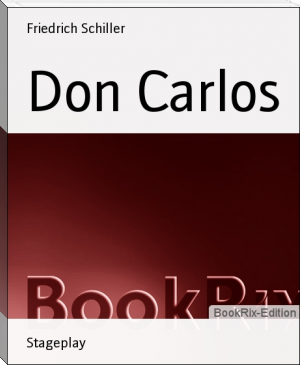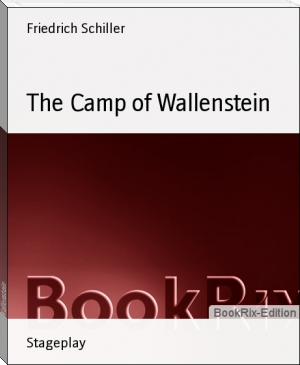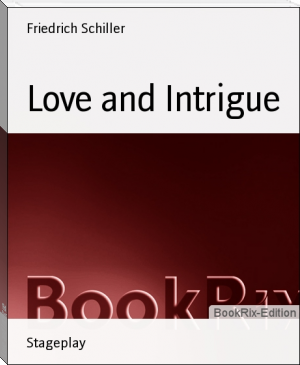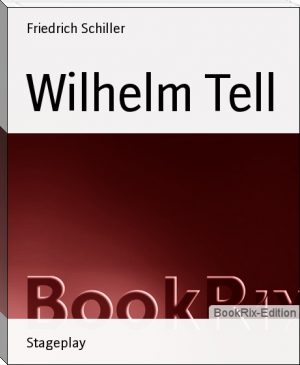Fiesco, Friedrich Schiller [uplifting novels .TXT] 📗

- Author: Friedrich Schiller
Book online «Fiesco, Friedrich Schiller [uplifting novels .TXT] 📗». Author Friedrich Schiller
vain you would deceive me. My heart discovers what is concealed from my eyes. Quick! Hasten after them. See! Tell me whither they carry him.
ROSA. Collect your spirits, madam. Arabella is gone.
LEONORA. Arabella will catch his dying look. The happy Arabella! Wretch that I am? 'twas I that murdered him. If I could have engaged his heart he would not have plunged into the world, nor rushed upon the daggers of assassins. Ah! she comes. Away! Oh, Arabella, speak not to me!
SCENE XI.
The former, ARABELLA.
ARABELLA. The Count is living and unhurt. I saw him gallop through the city. Never did he appear more handsome. The steed that bore him pranced haughtily along, and with its proud hoof kept the thronging multitude at a distance from its princely rider. He saw me as I passed, and with a gracious smile, pointing thither, thrice kissed his hand to me. (Archly.) What can I do with those kisses, madam?
LEONORA (highly pleased). Idle prattler! Restore them to him.
ROSA. See now, how soon your color has returned!
LEONORA. His heart he is ready to fling at every wench, whilst I sigh in vain for a look! Oh woman! woman!
[Exeunt.
SCENE XII. - The Palace of ANDREAS.
GIANETTINO and LOMELLINO enter hastily.
GIANETTINO. Let them roar for their liberty as a lioness for her young. I am resolved.
LOMELLINO. But - most gracious prince!
GIANETTINO. Away to hell with thy buts, thou three-hours procurator! I will not yield a hair's breadth? Let Genoa's towers shake their heads, and the hoarse sea bellow No to it. I value not the rebellious multitude!
LOMELLINO. The people are indeed the fuel; but the nobility fan the flame. The whole republic is in a ferment, people and patricians.
GIANETTINO. Then will I stand upon the mount like Nero, and regale myself with looking upon the paltry flames.
LOMELLINO. Till the whole mass of sedition falls into the hands of some enterprising leader, who will take advantage of the general devastation.
GIANETTINO. Poh! Poh! I know but one who might be dangerous, and he is taken care of.
LOMELLINO. His highness comes.
Enter ANDREAS - (both bow respectfully).
ANDREAS. Signor Lomellino, my niece wishes to take the air.
LOMELLINO. I shall have the honor of attending her.
[Exit LOMELLINO.
SCENE XIII.
ANDREAS and GIANETTINO.
ANDREAS. Nephew, I am much displeased with you.
GIANETTINO. Grant me a hearing, most gracious uncle!
ANDREAS. That would I grant to the meanest beggar in Genoa if he were worthy of it. Never to a villain, though he were my nephew. It is sufficient favor that I address thee as an uncle, not as a sovereign!
GIANETTINO. One word only, gracious sir!
ANDREAS. Hear first what thou hast done; then answer me. Thou hast pulled down an edifice which I have labored for fifty years to raise - that which should have been thy uncle's mausoleum, his only pyramid - the affections of his countrymen. This rashness Andreas pardons thee - -
GIANETTINO. My uncle and my sovereign - -
ANDREAS. Interrupt me not. Thou hast injured that most glorious work of mine, the constitution, which I brought down from heaven for Genoa, which cost me so many sleepless nights, so many dangers, and so much blood. Before all Genoa thou hast cast a stain upon my honor, in violating my institutions. Who will hold them sacred if my own blood despise them? This folly thy uncle pardons thee.
GIANETTINO (offended). Sir, you educated me to be the Duke of Genoa.
ANDREAS. Be silent. Thou art a traitor to the state, and hast attacked its vital principle. Mark me, boy! That principle is - subordination. Because the shepherd retired in the evening from his labor, thoughtest thou the flock deserted? Because Andreas' head is white with age, thoughtest thou, like a villain, to trample on the laws?
GIANETTINO (insolently). Peace, Duke! In my veins also boils the blood of that Andreas before whom France has trembled.
ANDREAS. Be silent! I command thee. When I speak the sea itself is wont to pay attention. Thou hast insulted the majesty of justice in its very sanctuary. Rebel! dost thou know what punishment that crime demands? Now answer! (GIANETTINO appears struck, and fixes his eyes on the ground without speaking). Wretched Andreas! In thy own heart hast thou fostered the canker of thy renown. I built up a fabric for Genoa which should mock the lapse of ages, and am myself the first to cast a firebrand into it. Thank my gray head, which would be laid in the grave by a relation's hand - thank my unjust love that, on the scaffold, I pour not out thy rebellious blood to satisfy the violated laws.
[Exit.
SCENE XIV.
GIANETTINO looks after the DUKE, speechless with anger, LOMELLINO
entering, breathless and terrified.
LOMELLINO. What have I seen! What have I heard! Fly, prince! Fly quickly! All is lost.
GIANETTINO (with inward rage). What was there to lose?
LOMELLINO. Genoa, prince: I come from the market-place. The people were crowding round a Moor who was dragged along bound with cords. The Count of Lavagna, with above three hundred nobles, followed to the criminal court. The Moor had been employed to assassinate Fiesco, and in the attempt was seized.
GIANETTINO (stamping violently on the ground). What, are all the devils of hell let loose at once?
LOMELLINO. They questioned him most strictly concerning his employer. The Moor confessed nothing. They tried the first degree of torture. Still he confessed nothing. They put him to the second. Then he spoke - he spoke. My gracious lord, how could you trust your honor to such a villain?
GIANETTINO (fiercely). Ask me no question?
LOMELLINO. Hear the rest! Scarcely was the word Doria uttered - I would sooner have seen my name inscribed in the infernal register than have heard yours thus mentioned - scarcely was it uttered when Fiesco showed himself to the people. You know the man - how winningly he pleads - how he is wont to play the usurer with the hearts of the multitude. The whole assembly hung upon his looks, breathless with indignation. He spoke little, but bared his bleeding arm. The crowd contended for the falling drops as if for sacred relics. The Moor was given up to his disposal - and Fiesco - a mortal blow for us! Fiesco pardoned him. Now the confined anger of the people burst forth in one tumultuous clamor. Each breath annihilated a Doria, and Fiesco was borne home amidst a thousand joyful acclamations.
GIANETTINO (with a ferocious laugh). Let the flood of tumult swell up to my very throat. The emperor! That sound alone shall strike them to the earth, so that not a murmur shall be heard in Genoa.
LOMELLINO. Bohemia is far from hence. If the emperor come speedily he may perhaps be present at your funeral feast.
GIANETTINO (drawing forth a letter with a great seal). 'Tis fortunate that he is here already. Art thou surprised at this? And didst thou think me mad enough to brave the fury of enraged republicans had I not known they were betrayed and sold?
LOMELLINO (with astonishment). I know not what to think!
GIANETTINO. But I have thought of something which thou couldst not know. My plan is formed. Ere two days are past twelve senators must fall. Doria becomes sovereign, and the Emperor Charles protects him. Thou seemest astonished - -
LOMELLINO. Twelve senators! My heart is too narrow to comprehend a twelvefold murder.
GIANETTINO. Fool that thou art! The throne will absolve the deed. I consulted with the ministers of Charles on the strong party which France still has in Genoa, and by which she might a second time seize on it unless they should be rooted out. This worked upon the emperor - he approved my projects - and thou shalt write what I will dictate to thee.
LOMELLINO. I know not yet your purpose.
GIANETTINO. Sit down and write - -
LOMELLINO. But what am I to write? (Seats himself.)
GIANETTINO. The names of the twelve candidates for death - Francis Zenturione.
LOMELLINO (writes). In gratitude for his vote he leads the funeral procession.
GIANETTINO. Cornelio Calva.
LOMELLINO. Calva.
GIANETTINO. Michael Zibo.
LOMELLINO. To cool him after his disappointment in the procuratorship.
GIANETTINO. Thomas Asserato and his three brothers. (LOMELLINO stops.)
GIANETTINO (forcibly). And his three brothers - -
LOMELLINO (writes). Go on.
GIANETTINO. Fiesco of Lavagna.
LOMELLINO. Have a care! Have a care! That black stone will yet prove fatal to you.
GIANETTINO. Scipio Bourgognino.
LOMELLINO. He may celebrate elsewhere his wedding - -
GIANETTINO. Ay, where I shall be director of the nuptials. Raphael Sacco.
LOMELLINO. I should intercede for his life until he shall have paid my five thousand crowns. (Writes.) Death strikes the balance.
GIANETTINO. Vincent Calcagno.
LOMELLINO. Calcagno. The twelfth I write at my own risk, unless our mortal enemy be overlooked.
GIANETTINO. The end crowns all - Joseph Verrina.
LOMELLINO. He is the very head of the viper that threatens us. (Rises and presents the paper to GIANETTINO.) Two days hence death shall make a splendid feast, at which twelve of the chief of Genoa's nobles will be present.
GIANETTINO (signs the paper). 'Tis done. Two days hence will be the ducal election. When the senate shall be assembled for that purpose these twelve shall, on the signal of a handkerchief, be suddenly laid low. My two hundred Germans will have surrounded the senate-house. At that moment I enter and claim homage as the Duke. (Rings the bell.)
LOMELLINO. And what of Andreas?
GIANETTINO (contemptuously). He is an old man. (Enter a servant.) If the Duke should ask for me say I am gone to mass. (Exit servant.) I must conceal the devil that's within beneath a saintly garb.
LOMELLINO. But, my lord, the paper?
GIANETTINO. Take it, and let it be circulated among our party. This letter must be dispatched by express to Levanto. 'Tis to inform Spinola of our intended plan, and bid him reach the capital early in the morning. (Going.)
LOMELLINO. Stop, prince. There is an error in our calculation. Fiesco does not attend the senate.
GIANETTINO (looking back). Genoa will easily supply one more assassin. I'll see to that.
[Exeunt different ways.
SCENE XV.-An Ante-chamber in FIESCO'S Palace.
FIESCO, with papers before him, and MOOR.
FIESCO. Four galleys have entered the harbor, dost say?
MOOR. Yes, they're at anchor in the port.
FIESCO. That's well. Whence are these expresses?
MOOR. From Rome, Placentia, and France.
FIESCO (opens the letters and runs over them). Welcome! welcome news! (In high spirits.) Let the
ROSA. Collect your spirits, madam. Arabella is gone.
LEONORA. Arabella will catch his dying look. The happy Arabella! Wretch that I am? 'twas I that murdered him. If I could have engaged his heart he would not have plunged into the world, nor rushed upon the daggers of assassins. Ah! she comes. Away! Oh, Arabella, speak not to me!
SCENE XI.
The former, ARABELLA.
ARABELLA. The Count is living and unhurt. I saw him gallop through the city. Never did he appear more handsome. The steed that bore him pranced haughtily along, and with its proud hoof kept the thronging multitude at a distance from its princely rider. He saw me as I passed, and with a gracious smile, pointing thither, thrice kissed his hand to me. (Archly.) What can I do with those kisses, madam?
LEONORA (highly pleased). Idle prattler! Restore them to him.
ROSA. See now, how soon your color has returned!
LEONORA. His heart he is ready to fling at every wench, whilst I sigh in vain for a look! Oh woman! woman!
[Exeunt.
SCENE XII. - The Palace of ANDREAS.
GIANETTINO and LOMELLINO enter hastily.
GIANETTINO. Let them roar for their liberty as a lioness for her young. I am resolved.
LOMELLINO. But - most gracious prince!
GIANETTINO. Away to hell with thy buts, thou three-hours procurator! I will not yield a hair's breadth? Let Genoa's towers shake their heads, and the hoarse sea bellow No to it. I value not the rebellious multitude!
LOMELLINO. The people are indeed the fuel; but the nobility fan the flame. The whole republic is in a ferment, people and patricians.
GIANETTINO. Then will I stand upon the mount like Nero, and regale myself with looking upon the paltry flames.
LOMELLINO. Till the whole mass of sedition falls into the hands of some enterprising leader, who will take advantage of the general devastation.
GIANETTINO. Poh! Poh! I know but one who might be dangerous, and he is taken care of.
LOMELLINO. His highness comes.
Enter ANDREAS - (both bow respectfully).
ANDREAS. Signor Lomellino, my niece wishes to take the air.
LOMELLINO. I shall have the honor of attending her.
[Exit LOMELLINO.
SCENE XIII.
ANDREAS and GIANETTINO.
ANDREAS. Nephew, I am much displeased with you.
GIANETTINO. Grant me a hearing, most gracious uncle!
ANDREAS. That would I grant to the meanest beggar in Genoa if he were worthy of it. Never to a villain, though he were my nephew. It is sufficient favor that I address thee as an uncle, not as a sovereign!
GIANETTINO. One word only, gracious sir!
ANDREAS. Hear first what thou hast done; then answer me. Thou hast pulled down an edifice which I have labored for fifty years to raise - that which should have been thy uncle's mausoleum, his only pyramid - the affections of his countrymen. This rashness Andreas pardons thee - -
GIANETTINO. My uncle and my sovereign - -
ANDREAS. Interrupt me not. Thou hast injured that most glorious work of mine, the constitution, which I brought down from heaven for Genoa, which cost me so many sleepless nights, so many dangers, and so much blood. Before all Genoa thou hast cast a stain upon my honor, in violating my institutions. Who will hold them sacred if my own blood despise them? This folly thy uncle pardons thee.
GIANETTINO (offended). Sir, you educated me to be the Duke of Genoa.
ANDREAS. Be silent. Thou art a traitor to the state, and hast attacked its vital principle. Mark me, boy! That principle is - subordination. Because the shepherd retired in the evening from his labor, thoughtest thou the flock deserted? Because Andreas' head is white with age, thoughtest thou, like a villain, to trample on the laws?
GIANETTINO (insolently). Peace, Duke! In my veins also boils the blood of that Andreas before whom France has trembled.
ANDREAS. Be silent! I command thee. When I speak the sea itself is wont to pay attention. Thou hast insulted the majesty of justice in its very sanctuary. Rebel! dost thou know what punishment that crime demands? Now answer! (GIANETTINO appears struck, and fixes his eyes on the ground without speaking). Wretched Andreas! In thy own heart hast thou fostered the canker of thy renown. I built up a fabric for Genoa which should mock the lapse of ages, and am myself the first to cast a firebrand into it. Thank my gray head, which would be laid in the grave by a relation's hand - thank my unjust love that, on the scaffold, I pour not out thy rebellious blood to satisfy the violated laws.
[Exit.
SCENE XIV.
GIANETTINO looks after the DUKE, speechless with anger, LOMELLINO
entering, breathless and terrified.
LOMELLINO. What have I seen! What have I heard! Fly, prince! Fly quickly! All is lost.
GIANETTINO (with inward rage). What was there to lose?
LOMELLINO. Genoa, prince: I come from the market-place. The people were crowding round a Moor who was dragged along bound with cords. The Count of Lavagna, with above three hundred nobles, followed to the criminal court. The Moor had been employed to assassinate Fiesco, and in the attempt was seized.
GIANETTINO (stamping violently on the ground). What, are all the devils of hell let loose at once?
LOMELLINO. They questioned him most strictly concerning his employer. The Moor confessed nothing. They tried the first degree of torture. Still he confessed nothing. They put him to the second. Then he spoke - he spoke. My gracious lord, how could you trust your honor to such a villain?
GIANETTINO (fiercely). Ask me no question?
LOMELLINO. Hear the rest! Scarcely was the word Doria uttered - I would sooner have seen my name inscribed in the infernal register than have heard yours thus mentioned - scarcely was it uttered when Fiesco showed himself to the people. You know the man - how winningly he pleads - how he is wont to play the usurer with the hearts of the multitude. The whole assembly hung upon his looks, breathless with indignation. He spoke little, but bared his bleeding arm. The crowd contended for the falling drops as if for sacred relics. The Moor was given up to his disposal - and Fiesco - a mortal blow for us! Fiesco pardoned him. Now the confined anger of the people burst forth in one tumultuous clamor. Each breath annihilated a Doria, and Fiesco was borne home amidst a thousand joyful acclamations.
GIANETTINO (with a ferocious laugh). Let the flood of tumult swell up to my very throat. The emperor! That sound alone shall strike them to the earth, so that not a murmur shall be heard in Genoa.
LOMELLINO. Bohemia is far from hence. If the emperor come speedily he may perhaps be present at your funeral feast.
GIANETTINO (drawing forth a letter with a great seal). 'Tis fortunate that he is here already. Art thou surprised at this? And didst thou think me mad enough to brave the fury of enraged republicans had I not known they were betrayed and sold?
LOMELLINO (with astonishment). I know not what to think!
GIANETTINO. But I have thought of something which thou couldst not know. My plan is formed. Ere two days are past twelve senators must fall. Doria becomes sovereign, and the Emperor Charles protects him. Thou seemest astonished - -
LOMELLINO. Twelve senators! My heart is too narrow to comprehend a twelvefold murder.
GIANETTINO. Fool that thou art! The throne will absolve the deed. I consulted with the ministers of Charles on the strong party which France still has in Genoa, and by which she might a second time seize on it unless they should be rooted out. This worked upon the emperor - he approved my projects - and thou shalt write what I will dictate to thee.
LOMELLINO. I know not yet your purpose.
GIANETTINO. Sit down and write - -
LOMELLINO. But what am I to write? (Seats himself.)
GIANETTINO. The names of the twelve candidates for death - Francis Zenturione.
LOMELLINO (writes). In gratitude for his vote he leads the funeral procession.
GIANETTINO. Cornelio Calva.
LOMELLINO. Calva.
GIANETTINO. Michael Zibo.
LOMELLINO. To cool him after his disappointment in the procuratorship.
GIANETTINO. Thomas Asserato and his three brothers. (LOMELLINO stops.)
GIANETTINO (forcibly). And his three brothers - -
LOMELLINO (writes). Go on.
GIANETTINO. Fiesco of Lavagna.
LOMELLINO. Have a care! Have a care! That black stone will yet prove fatal to you.
GIANETTINO. Scipio Bourgognino.
LOMELLINO. He may celebrate elsewhere his wedding - -
GIANETTINO. Ay, where I shall be director of the nuptials. Raphael Sacco.
LOMELLINO. I should intercede for his life until he shall have paid my five thousand crowns. (Writes.) Death strikes the balance.
GIANETTINO. Vincent Calcagno.
LOMELLINO. Calcagno. The twelfth I write at my own risk, unless our mortal enemy be overlooked.
GIANETTINO. The end crowns all - Joseph Verrina.
LOMELLINO. He is the very head of the viper that threatens us. (Rises and presents the paper to GIANETTINO.) Two days hence death shall make a splendid feast, at which twelve of the chief of Genoa's nobles will be present.
GIANETTINO (signs the paper). 'Tis done. Two days hence will be the ducal election. When the senate shall be assembled for that purpose these twelve shall, on the signal of a handkerchief, be suddenly laid low. My two hundred Germans will have surrounded the senate-house. At that moment I enter and claim homage as the Duke. (Rings the bell.)
LOMELLINO. And what of Andreas?
GIANETTINO (contemptuously). He is an old man. (Enter a servant.) If the Duke should ask for me say I am gone to mass. (Exit servant.) I must conceal the devil that's within beneath a saintly garb.
LOMELLINO. But, my lord, the paper?
GIANETTINO. Take it, and let it be circulated among our party. This letter must be dispatched by express to Levanto. 'Tis to inform Spinola of our intended plan, and bid him reach the capital early in the morning. (Going.)
LOMELLINO. Stop, prince. There is an error in our calculation. Fiesco does not attend the senate.
GIANETTINO (looking back). Genoa will easily supply one more assassin. I'll see to that.
[Exeunt different ways.
SCENE XV.-An Ante-chamber in FIESCO'S Palace.
FIESCO, with papers before him, and MOOR.
FIESCO. Four galleys have entered the harbor, dost say?
MOOR. Yes, they're at anchor in the port.
FIESCO. That's well. Whence are these expresses?
MOOR. From Rome, Placentia, and France.
FIESCO (opens the letters and runs over them). Welcome! welcome news! (In high spirits.) Let the
Free e-book «Fiesco, Friedrich Schiller [uplifting novels .TXT] 📗» - read online now
Similar e-books:





Comments (0)